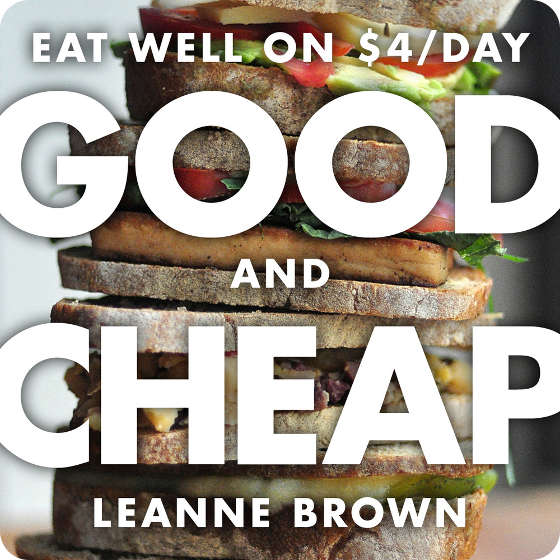We have a problem. All too often, eating well is equated with wealth. And while having money makes all kinds of things easier, eating well does not depend on having lots of it. Unfortunately, looking through most cookbooks, cooking magazines, and food blogs, you'll not likely get that message. Elaborate recipes with multi-page ingredient lists that read like the organic section of fancy grocery stores don't really inspire those looking at a dwindling grocery budget to look beyond canned food and frozen dinners. When several politicians recently struggled with the challenges of living on the average SNAP (food stamp) allotment of about $4.50 a day, the spotlight was focused on how to help make that challenge less daunting. And while there was a lot of talk about changes and additional help, not a lot of substantial change came to pass. Perhaps that's the political climate of our day or the difficulty of the challenge before us. That said, some people took the focus - however temporary - to heart and sought to make a difference.
One of those people is Leanne Brown, a food-studies scholar and avid home cook in NYC. This native of Canada is devoted to helping people eat well every day, no matter their food budget. With that in mind, a new cookbook project, Eating Well on $4/Day: Good and Cheap was born. Focused on teaching people where to spend their money (and where not to), how to stretch a buck (and ingredients), and how to make delicious, nutritious food without spending lots of time doing it, she hits the major obstacles in the way of many on government assistance. Moreover, she does it without talking down to or demeaning her audience.
The book begins with some of the basics anyone looking to have a healthy kitchen without a lot of investment will need. Everything from building weekly menus to figuring out what should (eggs) and should not (drinks) be on the grocery lists built from those menus is covered. None of the sections is very long, so they are easily digestible and approachable. Few people have the time to read multiple pages on the value of a single seasoning and that tends to be particularly true of those on public assistance, who often work multiple jobs. Kudos to Ms. Brown for understanding this and spending her words wisely by getting the basics down simply and briefly. After all, it's a cookbook and the bulk of the content should be about, you know, cooking!
And boy, does she deliver there! In addition to covering breakfast staples like oatmeal (and planting the seed that it can be served sweet or savory), she offers suggestions like buying large containers of plain yogurt and using them for everything from lightly-sweetened snacks to cucumber-laced sauces for dinner. I love how many times she puts ideas out there, not in recipe form, but as suggestions. It's an idea near and dear to my heart and I think more people would linger in their kitchens if they didn't find the concept of cooking so intimidating. Suddenly, cooking is less about following rules and instead about being inspired to use all of that chicken! Don't have rosemary? Try some other green thing in your pantry and maybe contemplate rosemary for another day. Or don't. You really do get to be in charge.
Part of why this project strikes a chord with me is it reminds me of my childhood and, more recently, my stint as a graduate wife. When I was a child, I didn't quite realize that my family was conventionally poor. We had good food. Strike that: we had great food. And my mother, in particular, taught me to use everything at my disposal and find new ways to enjoy the same old things. Later, when my family was living lean as my husband finished graduate school, we could easily dine on roast chicken one night, Greek chicken pitas for lunch the next day, and fragrant chicken curry yet another night. And there would still be chicken soup in our future because broth is so easy to make once you have a whole chicken on hand! So when I discovered this project earlier this summer, I nodded enthusiastically and enjoyed how banishing boredom and being creative and thrifty took the place of the giant ingredient lists or multi-hour fussy prep times that sometimes dominate cookbooks.
Available to the public for free as a download and for as little as $4 for a printed copy (using bulk, nonprofit purchasing), Eating Well on $4/Day: Good and Cheap is meant to make a difference and has hit all the points it needs to do just that. It's a practical cookbook for anyone who wants to eat (hint: that's all of us) and is a feel-good purchase for any home cook. And if you have the means, you can also donate as many copies as you'd like and those doing the printing will make sure that families needing this kind of resource the most will get a donated copy from you. To me, that's an idea that just warms my heart.

